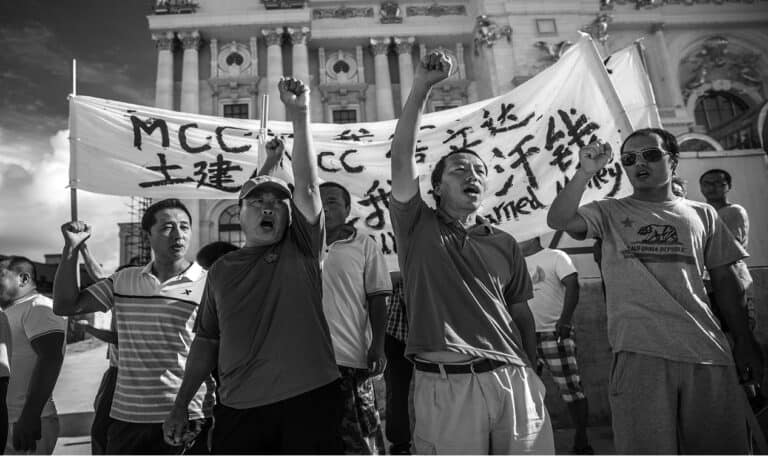
Juan Espinoza Muñoz is a student at Harvard Law School and a member of the Labor and Employment Lab.
Carlos has dark brown hair parted neatly to the side, glasses over wise brown eyes, and arms folded over a sturdy build of more than 40 years working in the hospitality industry of Palm Springs. He wears a light blue polo shirt, and an American flag mask as we talk at his kitchen table. It’s August 16, 2020, and at this point in the pandemic, it’s been 3 months since he received a letter saying that his furlough was made permanent, and that he had been let go after 33 years of working in room service at a Palm Springs hotel once known as the Wyndham, then Renaissance, and now Marriot.
Carlos immigrated from a town called Tecuala that is on the Pacific Ocean in the Mexican state of Nayarit. His face brightens up when he tells me about how he and several friends that were also in search of a better life and needed to support their families, left on December 31st of 1978 and arrived on January 1st, 1979 to celebrate New Year’s Day in Palm Springs. Two weeks later, Carlos was working as a dishwasher at the Canyon Hotel’s restaurant, 40 Love, where he bused tables and later switched to room service so he could take his own orders. After eight years of learning his love for hospitality, and relying upon his work there to begin a family, he and the rest of the staff were let go.
He quickly earned a spot on the room service team for the opening of a 410 room, 68-million-dollar Wyndham hotel built in tandem to the new Convention Center– as a larger effort by Sonny Bono to draw tourism to Palm Springs. Carlos says he toured the hotel before refrigerators were installed. He set up his department in preparation for the grand opening. He pauses, and tells me the exact date that the hotel opened to the public: November 18th, 1987.
He says they provided luxurious service back then – there were two shifts; five employees in the day and five in the evening. He recalls the Wyndham days as the good days: they had designated space where they could take phone orders directly from guests, a cashier that helped them process orders and checks, 4 weeks of paid vacation after working for 5 years, gratuities, small receptions and private dinners that allowed them to boost their income. He received career workshops and proper training – always knock on a guest’s door three times and always say their name three times. Managers knew his name, greeted him, and established a familial culture. The opening General Manager, stayed for 6 years – longer than any subsequent manager thereafter.
Two themes describe the progression of Carlos’s time at the hotel: changing management/ownership and a word the he frequently repeats – cutting. Cutting hours, cutting benefits, cutting staff, cutting positions, cutting tips, cutting training, and cutting holiday parties. Under the most recent ownership, Marriot, the hotel started retaining 2% of the total 18% gratuity charged of guests. He said workers knew this was wrong, but never knew that they could address it (similar to Amazon’s recent tip theft). He worked under 15 managers, several ownership and management companies, and a constantly shifting environment. By the time the pandemic hit, the room service department was left with one person for the day shift and another for the night shift. No designated space, no cashier, and less connection to guests.
As decades of Carlos’s life passed at the hotel, he saw fewer staff, more work, lower pay, more isolation, and more pressure at work. He is grateful and graceful when he speaks of past managers, but also astute. He chuckles as he says the last manager he worked for won many awards for being the best manager in the region – “yea, because she cut our hours, cut staff, and the hotel made more money, but we didn’t.”
I know Carlos because he is my best friend Stefanie’s dad and my dad’s coworker. Carlos and my dad have worked together since the hotel opened. They often attended school events in black slacks and a tuxedo white shirt. I’d see them and many others running by in this regal uniform as I sat atop stacked banquets chairs in the maze of back corridors of the hotel where I did homework while waiting for my dad to pick up a paycheck or get off work. I would also see him at Spanish language mass and at the hotel’s annual Christmas party hosted in the main ballroom. Stefanie and my sister both celebrated weddings in that ballroom – my Dad was the bartender for Stefanie’s wedding. He capped me at two drinks that night but I was still cheery enough to take a selfie with him. Those walls, although cloaked in elusive and constantly changing ownership and LLC’s, tell the stories of our families. Those walls have had more time with Carlos and my dad than Stefanie or I have had.
I reached out to Carlos because I’d heard he had been permanently laid off via email. I had been interviewing other family members because they too are older, immigrant-hospitality workers in Palm Springs laid off after decades of work without severance, benefits, or any genuine appreciation. Their stories reveal how painful at-will relationships can be when employees are dismissed for no cause after decades of working for an employer. It is no surprise that at-will employment is a judge made rule that stems from Horace Wood’s 1877 treatise, “Master and Servant.” That the rule which underlines our entire employment legal regime is premised on a treatise titled – Master and Servant – is telling. It is a corrosive foundation that sends a message that has become painfully clear during this pandemic: that workers are disposable.
But how can one explain this notion of employment to someone experiencing the heart break of being laid off after dedicating almost the entirety of their life to an employer? How can you explain that to someone that is experiencing what feels like losing your friends, your family, your community, your place, and yourself all at once – and with none of it in your power or control. How can one explain to family members that the law does not consider how they have invested decades of their spirit and soul to building a space from which they’ve now been removed and excluded? That at the end of giving up your life for an employer no one is going to ask you what the job means to you, how much of yourself you’ve given, how has this place shaped your life. That, in the eyes of the law, the life you’ve brought to an enterprise was nothing more than an expendable piece in a grander scheme of contractual at-will transactions.
California recently enacted a new law that will offer rehire rights to hotel workers laid off during the pandemic. This law may provide prospective relief to workers like Carlos, and it deserves celebration. But this law does not eliminate the costs that an at-will employment regime imposes on millions of workers across the country and which Carlos’ story illuminates.










Daily News & Commentary
Start your day with our roundup of the latest labor developments. See all
February 24
In today’s news and commentary, the NLRB uses the Obama-era Browning-Ferris standard, a fired National Park ranger sues the Department of Interior and the National Park Service, the NLRB closes out Amazon’s labor dispute on Staten Island, and OIRA signals changes to the Biden-era independent contractor rule. The NLRB ruled that Browning-Ferris Industries jointly employed […]
February 23
In today’s news and commentary, the Trump administration proposes a rule limiting employment authorization for asylum seekers and Matt Bruenig introduces a new LLM tool analyzing employer rules under Stericycle. Law360 reports that the Trump administration proposed a rule on Friday that would change the employment authorization process for asylum seekers. Under the proposed rule, […]
February 22
A petition for certiorari in Bivens v. Zep, New York nurses end their historic six-week-strike, and Professor Block argues for just cause protections in New York City.
February 20
An analysis of the Board's decisions since regaining a quorum; 5th Circuit dissent criticizes Wright Line, Thryv.
February 19
Union membership increases slightly; Washington farmworker bill fails to make it out of committee; and unions in Argentina are on strike protesting President Milei’s labor reform bill.
February 18
A ruling against forced labor in CO prisons; business coalition lacks standing to challenge captive audience ban; labor unions to participate in rent strike in MN